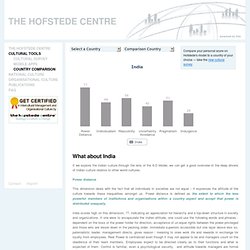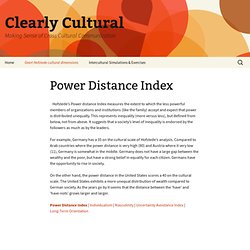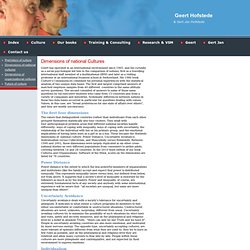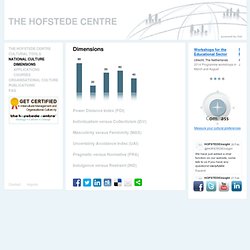

Aayesha Alvi
IS 679 Team 6. IS 679 Team 6. Bachelor%20Thesis%20final%20kristian%20lindholm. India. If we explore the Indian culture through the lens of the 6-D Model, we can get a good overview of the deep drivers of Indian culture relative to other world cultures.

Power distance This dimension deals with the fact that all individuals in societies are not equal – it expresses the attitude of the culture towards these inequalities amongst us. Power distance is defined as the extent to which the less powerful members of institutions and organisations within a country expect and accept that power is distributed unequally. India scores high on this dimension, 77, indicating an appreciation for hierarchy and a top-down structure in society and organizations.
Individualism The fundamental issue addressed by this dimension is the degree of interdependence a society maintains among its members. India, with a rather intermediate score of 48, is a society with both collectivistic and individualistic traits. Careers. Careers. What makes TCS & Cognizant Technology Solutions with contrasting business models outperform. N Shivapriya, ET Bureau May 10, 2012, 07.05AM IST MUMBAI: Two of the top five Indian IT service providers are differentiating themselves from the rest, as they continue to outperform their peers.

Tata Consultancy Services (TCS), the country's oldest and largest IT firm, grew 24% to $10 billion, despite its size. And even though Cognizant Technology Solutions ( CTS), the youngest and fastest growing, disappointed investors on Monday by reducing its revenue growth guidance by three percentage points to 20%, it will still grow faster than peers and the industry (11%-14%). The two are also the only India-centric providers to have improved their global market share substantially enough to shuffle the international pecking order of IT service providers in 2011. TCS moved up to 16 from 21 in global rankings and Cognizant to 26 from 33, according to a report released by research firm Gartner this month. Top Indian IT firms pip multinational rivals in incremental revenues. Bangalore: After spending the better part of the last decade lagging behind multinational rivals such as International Business Machines Corp.

(IBM) and Accenture Plc. in terms of winning large outsourcing deals, top Indian software companies are now starting to outpace them. Over the past four years, the likes of Tata Consultancy Services Ltd (TCS) and Cognizant Technology Solutions Corp. have added incremental revenues at a much faster clip than IBM or Capgemini SA, Mint’s analysis shows. This happened as Indian firms began competing aggressively for more high-margin consulting deals, shedding their dependence on traditional low-cost commoditized businesses to build strengths in more specialized and lucrative tasks. The results began to show. In that period, Capgemini generated €1.72 billion (around Rs.14,620 crore today) and IBM posted global services incremental revenue of $1.38 billion, with annual revenues declining in the last two years.
Cognizant - Business Consulting, IT Infrastructure, Outsourcing Services. Hofstede's Cultural Dimensions - Leadership Training from MindTools. Understanding Workplace Values Around the World Learn how to be more sensitive to the needs of people in different cultures.

We know that we are living in a global age. Technology has brought everyone much closer together. This means that people of different cultures find themselves working together and communicating more and more. This is exciting, but it can also be frustrating and fraught with uncertainty. Building connections with people from around the world is just one dimension of cultural diversity. How can we understand cultural differences? Fortunately, psychologist Dr Geert Hofstede asked himself this question in the 1970s. With access to people working for the same organization in over 40 countries of the world, he collected cultural data and analyzed his findings.
He scored each country using a scale of roughly 0 to 100 for each dimension. Power Distance Index. Hofstede’s Power distance Index measures the extent to which the less powerful members of organizations and institutions (like the family) accept and expect that power is distributed unequally.

This represents inequality (more versus less), but defined from below, not from above. It suggests that a society’s level of inequality is endorsed by the followers as much as by the leaders. For example, Germany has a 35 on the cultural scale of Hofstede’s analysis. Dimensions of national Cultures. Geert has operated in an international environment since 1965, and his curiosity as a social psychologist led him to the comparison of nations, first as a travelling international staff member of a multinational (IBM) and later as a visiting professor at an international business school in Switzerland.

His 1980 book Culture's Consequences combined his personal experiences with the statistical analysis of two unique data bases. The first and largest comprised answers of matched employee samples from 40 different countries to the same attitude survey questions. The second consisted of answers to some of these same questions by his executive students who came from 15 countries and from a variety of companies and industries. Systematic differences between nations in these two data bases occurred in particular for questions dealing with values. Dimensions. Power Distance Index (PDI) This dimension expresses the degree to which the less powerful members of a society accept and expect that power is distributed unequally.

The fundamental issue here is how a society handles inequalities among people.